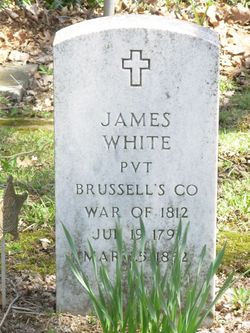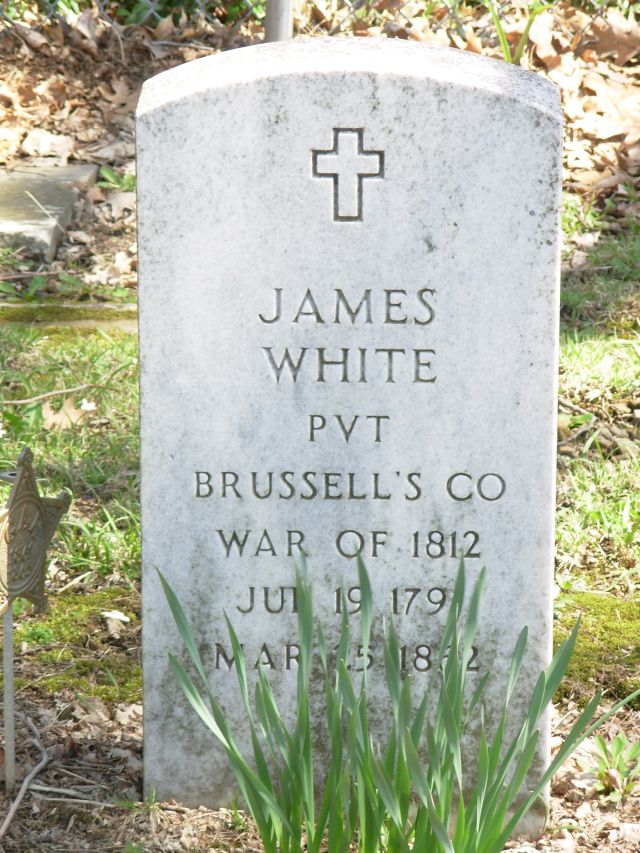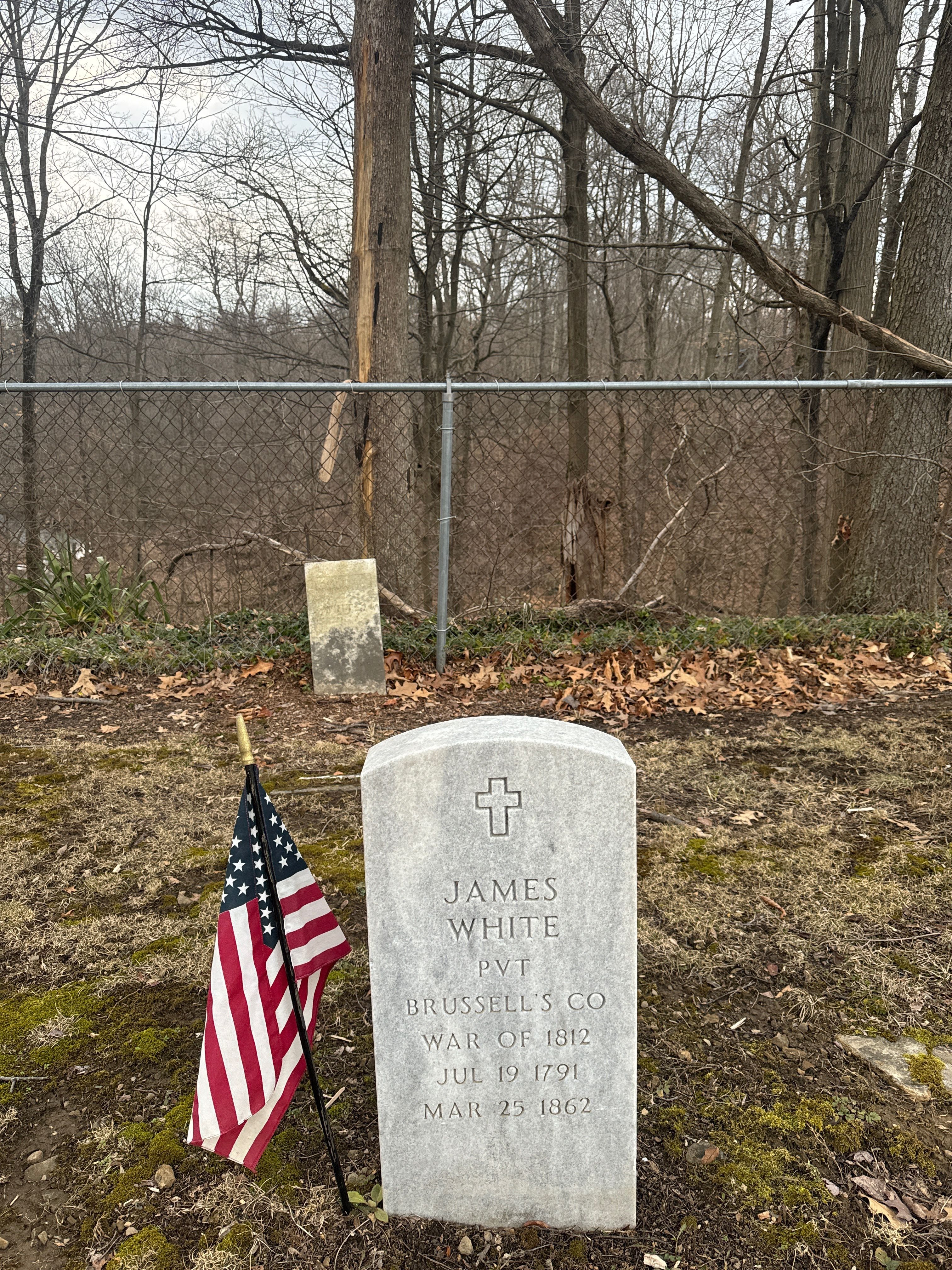"James White was a Virginian, and his father came to this country from Ireland. The former came to Trumbull county in the early days when this part of the country was yet a boundless forest, and he married Elizabeth Irwin, also from Virginia and of Dutch descent. . . James White was educated in the common schools of the Old Dominion state, where he received the practical training of pioneer times. In politics he was a Jacksonian Democrat, but was never active in political work, although as a soldier in the war of 1812 he served his country with credit. He was a farmer throughout life, and coming to Trumbull county in an early day in its history, he cleared away the forest primeval to make for himself a home, and with his family passed through the thrilling experiences of pioneer life. In those days wolves, bears, deer and small game were plentiful. He died in 1862 at the age of seventy-five years, and his good wife passed away nine years later, at the age of seventy-four years. He was the grandfather of eighty-eight grandchildren."
Family History of James White and Fannie Pittinger and their descendants, by Andrew J. White and Franc White, The Acorn Printery, Painesville, OH 1932, pages 60, 61:
"In the early days, wolves, bears, deer and other game were plentiful in those regions. James White would leave his family and take maple sugar, salt (which had been evaporated from the springs nearby) and other products to market at Pittsburg. This was a journey of several weeks. While he was gone his wife would boil the sap in kettles over an open fire in the log cabin. She would fasten the baby to her back. The wolves, attracted by the fire, would enter the cabin; and when she thought, by the baby's cry, that they were getting too close she would throw a gourd of boiling sap at them to scare them away.
"When James White reached a condition of sufficient affluence he built a brick house, burning the brick himself. The house has been razed, and the farm has been inundated to furnish water for Youngstown.
"In the War of 1812, the Indians chased his company back to their boats on Lake Erie. As they were running to safety a wounded man begged to be carried on and not have to endure death at the hands of the savages. James White halted while the rest rushed ahead. It was hard traveling through the water and deep grass to the boats, but he picked up the man and hastened on. The load was too heavy for him to go far without resting. He put him down and called to some of his companions to help him, but they were too intent on reaching safety to hear him, so he trudged on and finally reached the boat. His health was never good after this experience.
"In after years he was in Pittsburg with a load of poultry, when he noticed a man examining his load. James White recognized him as the man whom he had rescued. He asked him how he lost his leg. The man replied, "By an Indian in the War of 1812". Then James asked him if he remembered being carried through the swamp to the boat. The man remembered. James White said, "I am the man who carried you to the boat". The man walked away, without considering it worth his while to say, "I thank you."
"The homestead in Weathersfield Twp., Trumbull County, Ohio, was on Mineral Ridge along rural mail route No. 1. It was a log house, later replaced by the home built by James' son, Jacob, which stood there for many years. (update: When Mahoning County was formed, it included Ohltown which is where the farm was located, before the area was flooded in the 1920's to form the Meander Creek Reservoir, which provides water for the City of Youngstown.)
"In 1840 James White bought 49.94 acres of land in Middlefield township, near where the Mormons settled, called Nauvoo, and he sold it to his son William on Sept. 5, 1840 for the consideration of $100. On Feb. 5, 1841 he bought 54.28 acres for $163, and sold it to his son William for $100 in November, 1843. In 1846 C. L. Whitney deeded James White of Weathersfield, Trumbull County, Ohio, 57.38 acres for $242.25. In June, 1855 Jacob Perkins deeded to James White 165.54 acres for $827.70. In June, 1858 the heirs of Horace Pomeroy deeded to James White 42.77 acres for $546. On March 24, 1854 James White deeded to his son Andrew 97.38 acres for $200. James White, Sr. deeded to his son James 100 acres for $200 on May 20, 1856. John A. Rockwell and Mary W. Rockwell deeded to James White 168.44 acres for $200 in Jan. 1861. The records of these deeds are in the Chardon Court House, Geauga County, Ohio. These sons were true pioneers and followed in their father's footsteps in clearing the land. Their cattle wandered far in search of grass, and were often found in Windsor, Ashtabula County, and Bloomfield, Trumbull County, a distance of ten and twelve miles."
"James White was a Virginian, and his father came to this country from Ireland. The former came to Trumbull county in the early days when this part of the country was yet a boundless forest, and he married Elizabeth Irwin, also from Virginia and of Dutch descent. . . James White was educated in the common schools of the Old Dominion state, where he received the practical training of pioneer times. In politics he was a Jacksonian Democrat, but was never active in political work, although as a soldier in the war of 1812 he served his country with credit. He was a farmer throughout life, and coming to Trumbull county in an early day in its history, he cleared away the forest primeval to make for himself a home, and with his family passed through the thrilling experiences of pioneer life. In those days wolves, bears, deer and small game were plentiful. He died in 1862 at the age of seventy-five years, and his good wife passed away nine years later, at the age of seventy-four years. He was the grandfather of eighty-eight grandchildren."
Family History of James White and Fannie Pittinger and their descendants, by Andrew J. White and Franc White, The Acorn Printery, Painesville, OH 1932, pages 60, 61:
"In the early days, wolves, bears, deer and other game were plentiful in those regions. James White would leave his family and take maple sugar, salt (which had been evaporated from the springs nearby) and other products to market at Pittsburg. This was a journey of several weeks. While he was gone his wife would boil the sap in kettles over an open fire in the log cabin. She would fasten the baby to her back. The wolves, attracted by the fire, would enter the cabin; and when she thought, by the baby's cry, that they were getting too close she would throw a gourd of boiling sap at them to scare them away.
"When James White reached a condition of sufficient affluence he built a brick house, burning the brick himself. The house has been razed, and the farm has been inundated to furnish water for Youngstown.
"In the War of 1812, the Indians chased his company back to their boats on Lake Erie. As they were running to safety a wounded man begged to be carried on and not have to endure death at the hands of the savages. James White halted while the rest rushed ahead. It was hard traveling through the water and deep grass to the boats, but he picked up the man and hastened on. The load was too heavy for him to go far without resting. He put him down and called to some of his companions to help him, but they were too intent on reaching safety to hear him, so he trudged on and finally reached the boat. His health was never good after this experience.
"In after years he was in Pittsburg with a load of poultry, when he noticed a man examining his load. James White recognized him as the man whom he had rescued. He asked him how he lost his leg. The man replied, "By an Indian in the War of 1812". Then James asked him if he remembered being carried through the swamp to the boat. The man remembered. James White said, "I am the man who carried you to the boat". The man walked away, without considering it worth his while to say, "I thank you."
"The homestead in Weathersfield Twp., Trumbull County, Ohio, was on Mineral Ridge along rural mail route No. 1. It was a log house, later replaced by the home built by James' son, Jacob, which stood there for many years. (update: When Mahoning County was formed, it included Ohltown which is where the farm was located, before the area was flooded in the 1920's to form the Meander Creek Reservoir, which provides water for the City of Youngstown.)
"In 1840 James White bought 49.94 acres of land in Middlefield township, near where the Mormons settled, called Nauvoo, and he sold it to his son William on Sept. 5, 1840 for the consideration of $100. On Feb. 5, 1841 he bought 54.28 acres for $163, and sold it to his son William for $100 in November, 1843. In 1846 C. L. Whitney deeded James White of Weathersfield, Trumbull County, Ohio, 57.38 acres for $242.25. In June, 1855 Jacob Perkins deeded to James White 165.54 acres for $827.70. In June, 1858 the heirs of Horace Pomeroy deeded to James White 42.77 acres for $546. On March 24, 1854 James White deeded to his son Andrew 97.38 acres for $200. James White, Sr. deeded to his son James 100 acres for $200 on May 20, 1856. John A. Rockwell and Mary W. Rockwell deeded to James White 168.44 acres for $200 in Jan. 1861. The records of these deeds are in the Chardon Court House, Geauga County, Ohio. These sons were true pioneers and followed in their father's footsteps in clearing the land. Their cattle wandered far in search of grass, and were often found in Windsor, Ashtabula County, and Bloomfield, Trumbull County, a distance of ten and twelve miles."
Inscription
JAMES
WHITE
PVT
BRUSSELL'S CO
WAR OF 1812
JUN 19 179
MAR 25 1862
Family Members
Advertisement
Advertisement











